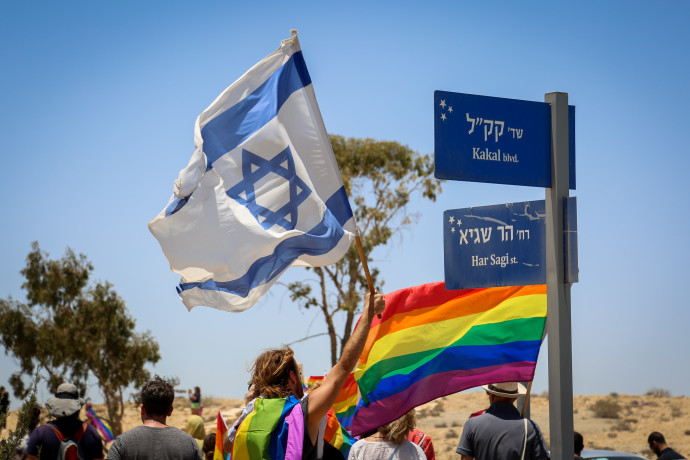Pressure from the High Court of Justice on Wednesday led the police to reinstate the route of the gay pride parade through the center of Mitzpe Ramon, instead of its outskirts.
The move came after Justices Uzi Vogelman, Daphna Barak Erez and Ruth Ronen (in one of her first high profile rulings since joining the court) scolded the police for citing security as the reason for forcing the parade away from the town center.
On Sunday, LGBTQ activists filed a petition with the High Court after police notified them that their parade was approved, but the route was not.
The alteration was condemned by the petitioners and by local residents who claimed that “basic human rights are being trampled on in Israel.”
Though police had approved the parade’s original route they changed it after a complaint from local yeshiva head Rabbi Tzvi Kustiner.

Stories have emerged of threats to Kustiner’s life by LGBTQ activists and threats of divine retribution if police support LGBTQ causes.
Kustiner's protests
Kustiner, an anti-gay activist, objected to the parade being held at all.
The conflict comes a month after a Kustiner speech against the LGBTQ community. “This is the battle that I tell everyone to fight... Be courageous. In your workplace say ‘LGBT people, go home!’ ‘gays, go home!’” Kustiner said in video footage on KAN TV.
“Fight them on everything. It is our job everywhere not to be ashamed of our Judaism. This crazy government, this insanity, God willing it will fall.” Several students responded with “Amen.”
“Fight them on everything. It is our job everywhere not to be ashamed of our Judaism. This crazy government, this insanity, God willing it will fall.”
Rabbi Tzvi Kustiner
Kustiner is a member of the extremist Noam Party, headed by MK Avi Maoz, established by the hard-line wing of the religious-Zionist community, and a close associate of Rabbi Zvi Yisrael Tau, head of Yeshivat Har Hamor.
Mitzpe Ramon’s mayor protested against the gay pride parade last year, but it proceeded.
A dozen or so parades are held in different cities each year, the largest being in Tel Aviv, involving periodic friction between religious authorities, law enforcement and LGBTQ activists.
Jerusalem Post Staff contributed to this report.
